
MGF (Mechano Growth Factor) – 5MG
$60.00
Discount per Quantity
| Quantity | Discount | Price |
|---|---|---|
| 5 - 8 | 5% | $57.00 |
| 9 + | 10% | $54.00 |
Scientific Overview of MGF
Mechano-Growth Factor (MGF), also referred to as Insulin-like Growth Factor-1Eb (IGF-1Eb), is an isoform of IGF-1 produced through alternative splicing. It has been examined for its potential involvement in muscle remodeling, cellular proliferation, and neuroprotective pathways. Research suggests that this isoform may play a role in activating satellite cells in skeletal muscle and could participate in processes linked to tissue repair and cell survival. Its presence has also been reported in contexts related to cardiac, neuronal, and connective tissue environments.
Alternative Names: Mechano-Growth Factor, IGF-1Eb
MGF Studies and Research Data
MGF Interactions with Cardiac Tissues
Investigations in large animal models, including sheep subjected to ischemic injury, suggest that MGF may offer protective actions for cardiac tissue. Preliminary findings reported reduced cardiomyocyte compromise and proposed that the peptide’s E-domain may mitigate myocardial stress responses. Additional studies in mouse models under hypoxic conditions indicated that MGF exposure might encourage mesenchymal stem cell migration toward compromised cardiac tissue, potentially supporting cell survival mechanisms through pathways linked with apoptosis regulation.
Inflammatory Contexts and Recovery
Studies have suggested that MGF may influence macrophage dynamics during skeletal muscle inflammation. Evidence points toward a potential role in extending macrophage presence and modulating cytokine expression, which may contribute to tissue remodeling. These preliminary findings highlight the possibility that MGF participates in recovery processes by shaping the inflammatory environment and supporting regenerative cascades.
Skeletal Muscle Growth and Maintenance
Rodent research has indicated that exposure to MGF may correlate with hypertrophy and differentiation of muscle fibers. Findings include measurable increases in fiber size and enhanced satellite cell activation following prolonged exposure. Additional experiments explored its potential relevance in degenerative muscular conditions, suggesting that MGF might improve precursor cell survival and support the integration of transplanted myogenic cells.
Aging and Cellular Regulation
Investigations into IGF-1 splice variants highlight cell aging as a key determinant in isoform production. Studies propose that MGF may reduce aspects of cellular senescence in younger muscle cells while influencing hypertrophy pathways in older cohorts. Findings also suggest that MGF might stimulate myotube formation and increase contractile protein expression, potentially sustaining aspects of muscle function across developmental stages.
Neurological and Developmental Investigations
Research in developing murine brains identified MGF expression in regions associated with neuronal regeneration. Studies in hypoxic conditions suggested that MGF may be overexpressed in regenerating regions, potentially contributing to neuroprotection. Early-stage models of neurodegenerative conditions, including amyotrophic lateral sclerosis (ALS), reported that exposure to MGF appeared to correlate with improved neuron activity, though further study is needed.
Connective Tissue and Cartilage Studies
Cartilage tissues, often limited in recovery potential, have been a focus for exploring MGF’s possible impact. Research suggests that MGF may support chondrocyte survival and migration following mechanical stress. Preliminary data propose that its presence might help mitigate apoptotic activity in cartilage tissue, which could be relevant in contexts such as disc degeneration or joint deterioration.
Fibrosis and Tissue Remodeling
Animal models of muscle injury and fibrosis have been used to assess MGF’s potential impact on structural recovery. Findings indicate that MGF may contribute to reduced fibrosis markers, including type I and III collagen expression, and may correlate with lowered levels of inflammatory cytokines and oxidative stress indicators. While satellite cell activity appeared unaffected in these models, the modulation of immune and stress responses suggests a possible indirect role in tissue regeneration.
MGF and Bone Tissue Investigations
Studies involving surgically induced bone defects in animal models reported that MGF exposure may correlate with improved recovery processes compared to control and IGF-1 groups. Histological analysis hinted at possible activation of MAPK-Erk1/2 signaling, suggesting that MGF might influence pathways central to bone tissue repair and cellular growth.
Conclusion
Current research highlights the diverse contexts in which Mechano-Growth Factor (MGF) has been explored, spanning muscle, cardiac, neuronal, connective tissue, and bone systems. While studies suggest potential involvement in cellular survival, regenerative cascades, and modulation of inflammatory responses, the findings remain preliminary. Continued exploration is required to better understand the biological relevance and regulatory pathways of this IGF-1 isoform.
References
- Doroudian G, Pinney J, Ayala P, Los T, Desai TA, Russell B. Sustained delivery of MGF peptide from microrods attracts stem cells and reduces apoptosis of myocytes. Biomed Microdevices. 2014 Oct;16(5):705-15.
- Kandalla PK, Goldspink G, Butler-Browne G, Mouly V. Mechano Growth Factor E peptide (MGF-E), derived from an isoform of IGF-1, activates human muscle progenitor cells and induces an increase in their fusion potential at different ages. Mech Ageing Dev. 2011 Apr.
- Carpenter V, Matthews K, Devlin G, Stuart S, Jensen J, Conaglen J, Jeanplong F, Goldspink P, Yang SY, Goldspink G, Bass J, McMahon C. Mechano-growth factor reduces loss of cardiac function in acute myocardial infarction. Heart Lung Circ. 2008 Feb;17(1):33-9.
- Goldspink G, Yang SY. Effects of activity on growth factor expression. Int J Sport Nutr Exerc Metab. 2001 Dec;11 Suppl:S21-7.
- Song Y, Xu K, Yu C, Dong L, Chen P, Lv Y, Chiang MYM, Li L, Liu W, Yang L. The use of mechano growth factor to prevent cartilage degeneration in knee osteoarthritis. J Tissue Eng Regen Med. 2018 Mar;12(3):738-749.
- Liu X, Zeng Z, Zhao L, Chen P, Xiao W. Impaired Skeletal Muscle Regeneration Induced by Macrophage Depletion Could Be Partly Ameliorated by MGF Injection. Front Physiol. 2019 May 17;10:601.
- Zabłocka B, Goldspink PH, Goldspink G, Górecki DC. Mechano-Growth Factor: an important cog or a loose screw in the repair machinery? Front Endocrinol (Lausanne). 2012 Nov 1;3:131.
- Yang SY & Goldspink G (2002). Different roles of the IGF-IEc peptide (MGF) and mature IGF-I in myoblast proliferation and differentiation. FEBS Lett 522, 156-160.
- Goldspink G, Yang SY, Skarli M & Vrbova G (1996). Local growth regulation is associated with an isoform of IGF-I that is expressed in normal muscles but not in dystrophic muscles. J Physiol 495, 162.
- Hill M & Goldspink G (2003). Expression and splicing of the insulinlike growth factor gene in rodent muscle is associated with muscle satellite (stem) cell activation following local tissue damage. J Physiol 549, 409-418.
- Sun KT, Cheung KK, Au SWN, Yeung SS, Yeung EW. Overexpression of Mechano-Growth Factor Modulates Inflammatory Cytokine Expression and Macrophage Resolution in Skeletal Muscle Injury. Front Physiol. 2018 Jul 26;9:999.
- Zabłocka B, Goldspink PH, Goldspink G, Górecki DC. Mechano-Growth Factor: an important cog or a loose screw in the repair machinery? Front Endocrinol (Lausanne). 2012 Nov 1;3:131.
Disclaimer:
The products mentioned are intended solely for laboratory research and in-vitro experimentation. They are not approved for human or animal use of any kind. All details provided are for educational purposes only. By purchasing from this site, you agree to comply with our Terms and Conditions.
14 reviews for MGF (Mechano Growth Factor) – 5MG
Only logged in customers may leave a review.
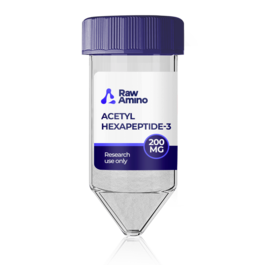
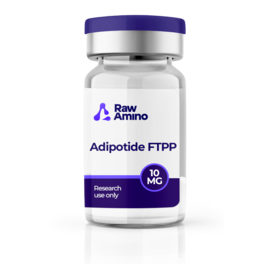
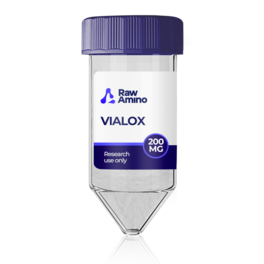
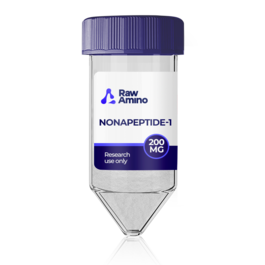
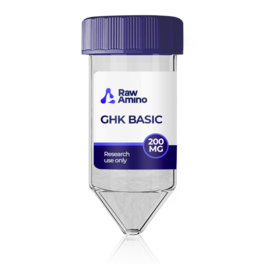
carl47 –
Excellent. Was unsure of PEG vs MGF and team answered my questions quickly and with some expertise which was helpful
colejohn –
jessica_king –
High standard for not that high of a price. Peptides do what they’re supposed to.
lab270 –
darrenlawson –
They have a nice selection of peptides but I do notice they have a bit of a hard time keeping up with supplies
angela3120 –
Susan907 –
Susan90756 –
Gregg J. –
AlexisW12 –
quant581x –
peptide849x –
nbell –
ryan8020 –